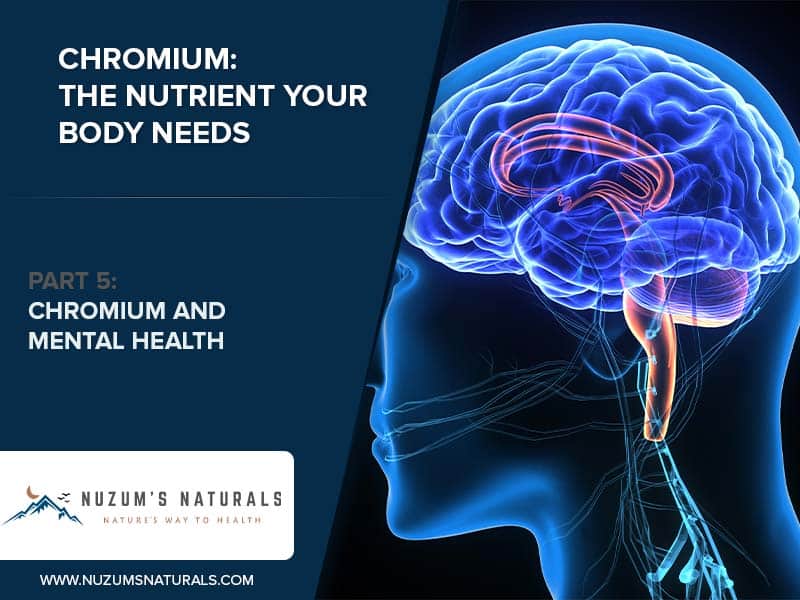Eating a healthy diet is necessary for maintaining optimal health, but it can be difficult to know which nutrients are necessary. One such nutrient that many people don’t get enough of in their diets is chromium. Without adequate chromium intake, you may experience changes in blood sugar levels, fatigue, and changes in mood.
Fortunately, there are plenty of ways to ensure that your body gets the chromium it needs! By incorporating chromium-rich foods into your diet and supplementing with multivitamins or supplements if needed, you can make sure that your body has all the tools it needs for optimal health. In this article, we will discuss why chromium is important for our health and how to incorporate it into our diets.

1Introduction
Chromium is a trace element that is crucial for human health. It is widely distributed in the environment and can be found in various food sources, such as whole grains, fruits, vegetables, and meats. The human body only requires small amounts of chromium, but it plays an integral role in several physiological processes.
Why is chromium vital for health? Chromium is important for health because it plays a role in regulating blood sugar metabolism. It has been shown to enhance insulin sensitivity, which is critical for controlling blood sugar levels. Insulin sensitivity refers to the ability of insulin to efficiently regulate blood sugar levels, and a decrease in insulin sensitivity can lead to conditions such as Type 2 diabetes. Chromium also has the potential to improve heart health by affecting cholesterol and triglyceride levels and blood pressure and reducing the risk of cardiovascular disease.
In addition, chromium has been studied for its potential benefits in weight loss and mental health. It has been shown to regulate appetite and improve body composition and modulate neurotransmitters and mood. In the realm of immune function, chromium has been found to have anti-inflammatory effects and potentially prevent infections.
This report will provide a comprehensive overview of chromium and its various health benefits. The report is divided into several sections, starting with an introduction to chromium and its importance for health. Subsequent sections will cover chromium’s role in blood sugar control, heart health, weight loss, mental health, immune function, and chromium deficiency and supplementation. Finally, the report will conclude with a summary of key findings, future research directions, and recommendations for incorporating chromium into a healthy diet.

2Chromium’s Role In Blood Sugar Control
Chromium plays a crucial role in glucose metabolism by enhancing insulin sensitivity. Insulin is a hormone that regulates blood sugar levels, and when it is not working efficiently, it can lead to elevated blood sugar levels and an increased risk of Type 2 diabetes. Chromium works by increasing the number of insulin receptors on the cells, which, in turn, allows insulin to bind more effectively and regulate blood sugar levels. Chromium also helps increase glucose uptake into the cells, where it can be used as energy.
In addition to enhancing insulin sensitivity, chromium has been shown to improve insulin function. Chromium supplementation has been found to improve insulin sensitivity and glucose uptake in both healthy individuals and those with Type 2 diabetes. By improving insulin sensitivity and function, chromium has the potential to help regulate blood sugar levels and reduce the risk of Type 2 diabetes.
Numerous clinical studies have been conducted to examine the effects of chromium on blood sugar control. The results of these studies have been largely positive, with many studies finding that chromium supplementation can help improve insulin sensitivity and glucose metabolism. In some cases, chromium supplementation has been found to be as effective as traditional diabetic medications in regulating blood sugar levels.

3Chromium And Heart Health
Chromium is an essential nutrient that has been shown to have a significant impact on heart health. It can have a positive impact on cholesterol and triglyceride levels in the blood. Chromium supplementation has been found to reduce total cholesterol levels, low-density lipoprotein (LDL) cholesterol levels, and triglycerides. By reducing these risk factors for cardiovascular disease, chromium has the potential to reduce the risk of heart disease and stroke.
In addition to its impact on cholesterol and triglycerides, chromium has been shown to have an effect on blood pressure. Chromium supplementation has been found to reduce systolic and diastolic blood pressure, potentially reducing the risk of hypertension and cardiovascular disease. Chromium works by increasing insulin sensitivity, which can help regulate blood pressure levels and reduce the risk of cardiovascular disease.
Chromium’s positive impact on cholesterol and triglyceride levels and blood pressure, combined with its ability to regulate insulin sensitivity, make it a potential tool in preventing cardiovascular disease. Chromium supplementation has been found to reduce the risk of heart disease and stroke, making it a significant nutrient for maintaining overall heart health. By reducing cholesterol and triglyceride levels, regulating blood pressure, and improving insulin sensitivity, chromium has the potential to prevent cardiovascular disease and promote overall heart health. It is an important nutrient for individuals concerned about their heart health and those at risk of cardiovascular disease.

4Chromium And Weight Loss
Chromium is an essential nutrient that has been shown to play a role in weight loss and body composition. It has been shown to play a role in regulating appetite and food cravings. Chromium supplementation has been found to reduce food cravings and improve feelings of fullness, potentially reducing caloric intake and promoting weight loss. This is due to chromium’s impact on insulin sensitivity and glucose metabolism, which can regulate hunger hormones and reduce food cravings.
In addition to its impact on appetite regulation, chromium has been shown to have an effect on body composition. Chromium supplementation has been found to increase lean muscle mass, reduce body fat, and improve body composition. This is due to chromium’s impact on insulin sensitivity and glucose metabolism, which can help regulate body weight and improve body composition.
Clinical studies have shown that chromium supplementation can be an effective tool in weight loss and body composition improvement. These studies have found that chromium supplementation can lead to significant reductions in body weight, body fat, and waist circumference. Chromium supplementation has also been found to improve body composition by increasing lean muscle mass and reducing body fat. By regulating appetite, improving body composition, and reducing body weight, chromium has the potential to be a powerful tool in promoting weight loss and improving overall body composition. It is a powerful nutrient for individuals concerned about their weight and those looking to improve their body composition.

5Chromium And Mental Health
Chromium is an essential nutrient that has been shown to play a role in mental health. It has been shown to play a role in neurotransmitter function and mood regulation. Chromium supplementation has been found to improve neurotransmitter function, including serotonin, which is involved in regulating mood, appetite, and sleep. Chromium has also been shown to improve symptoms of depression and anxiety, potentially by regulating neurotransmitter function.
Chromium supplementation has been found to have a positive effect on symptoms of anxiety and depression. Chromium has been shown to improve mood, reduce symptoms of anxiety and depression, and potentially improve cognitive function. These effects are likely due to chromium’s impact on neurotransmitter function and its role in regulating mood.
In addition to its impact on mood and anxiety, chromium has been shown to have potential benefits for cognitive function. Chromium supplementation has been found to improve focus, concentration, and cognitive function, potentially by regulating neurotransmitter function and improving glucose metabolism. By regulating neurotransmitter function and mood, reducing symptoms of anxiety and depression, and improving cognitive function, chromium has the potential to be a powerful tool in promoting mental health and well-being. It is an important nutrient for individuals concerned about their mental health and those looking to improve their cognitive function.

6Chromium And Immune Function
Chromium is a vital mineral that has been shown to play a significant role in the functioning of the immune system. It has been shown to play a critical role in the functioning of the immune system. Chromium supplementation has been found to improve the body’s ability to fight off infections and reduce inflammation. Chromium is also known to improve the production and function of T cells, which are critical components of the immune system responsible for fighting off pathogens and infections.
Inflammation is a normal response of the body’s immune system to injury or infection. However, chronic inflammation has been linked to a variety of diseases and health problems, including heart disease, arthritis, and cancer. Chromium has been shown to have anti-inflammatory properties, reducing inflammation in the body and potentially reducing the risk of chronic health problems.
In addition to its impact on inflammation, chromium has also been shown to have potential benefits in preventing infections. Chromium supplementation has been found to improve the body’s ability to fight off infections, potentially by improving the function of T cells and reducing inflammation in the body. Chromium plays a critical role in the functioning of the immune system and has the potential to have a significant impact on preventing infections and reducing inflammation in the body. It is an essential nutrient for individuals concerned about their immune health and those looking to prevent infections and reduce their risk of chronic health problems.

7Chromium Deficiency And Supplementation
Chromium is an essential mineral that plays a crucial role in the body’s health and well-being. Chromium deficiency can lead to a variety of health problems, while supplementation can offer a range of benefits. Chromium deficiency is relatively rare but can occur due to a variety of factors, including a diet low in chromium-rich foods, excessive alcohol consumption, and the use of certain medications. The symptoms of chromium deficiency can include changes in blood sugar levels, fatigue, and changes in mood.
The recommended daily intake of chromium varies depending on age and sex, but it is generally between 20 and 35 mcg per day. Chromium-rich foods include whole grains, meat, poultry, and dairy products. In addition to dietary sources, chromium supplementation is also available in the form of supplements and multivitamins.
Chromium supplementation is generally considered safe when taken at recommended doses. However, high doses of chromium can cause side effects such as nausea, headache, and dizziness. In addition, chromium can interact with certain medications, such as insulin, so it is vital to speak with a healthcare provider before starting supplementation.

8Conclusion
This section summarizes the key findings from the report on chromium and its role in various aspects of health. It also discusses future research directions and provides recommendations for incorporating chromium into a healthy diet. Chromium plays a crucial role in blood sugar control, heart health, weight loss, mental health, immune function, and more. It has been shown to improve insulin sensitivity, regulate appetite, and improve mood and cognitive function. Chromium supplementation is generally safe when taken at recommended doses.
However, high doses can cause side effects. There is still much to learn about chromium and its effects on health, particularly in areas such as mental health and immune function. Future research should focus on determining the optimal dose of chromium for different health outcomes, exploring the long-term effects of supplementation, and examining the potential for chromium to interact with other nutrients and medications.
Incorporating chromium-rich foods into a balanced diet is the best way to ensure adequate intake of this essential mineral. Chromium-rich foods include whole grains, meat, poultry, and dairy products. For those who may not be able to get enough chromium from their diet, supplements, and multivitamins are also available. However, it is vital to speak with a healthcare provider before starting supplementation and to follow recommended doses to minimize the risk of side effects.
In conclusion, chromium is an essential mineral that plays a key role in many aspects of our health. It can help regulate blood sugar levels, improve heart health and mental well-being, aid weight loss efforts, boost the immune system, and more. Although chromium supplementation is generally safe when taken at recommended doses, it’s best to consult with your doctor before starting any new supplement regimen. The best way to ensure adequate intake of this nutrient is by incorporating chromium-rich foods into a balanced diet. If you are unable to get enough from food alone or have specific dietary needs that make it difficult for you to meet your daily requirements through nutrition alone, then supplements may be necessary – just remember to always speak with a healthcare provider first! With proper nutrition and supplementation, you can ensure that your body has all the tools it needs for optimal health!

